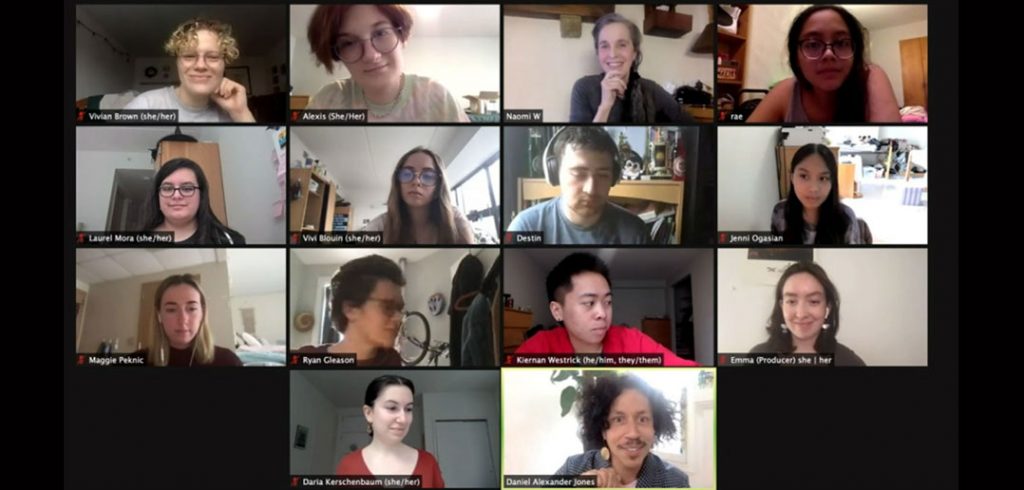This fall, the One Flea Spare Project brought together faculty and students from five universities—Fordham, the University of Massachusetts Amherst, Princeton University, Georgetown University, and SUNY Purchase—for shared projects, workshops, and classes, based on themes raised in the play. Set in London at a time when the city was beset by plague, the play revolves around a wealthy couple who is preparing to flee their house but are instead forced to quarantine for 28 days with two strangers who’ve snuck into their home.
In November, One Flea Spare’s creator, Naomi Wallace, participated in a webinar for the project for all of the universities involved, and this semester, she led a two-week playwriting workshop connected to the playwriting class that Fordham’s Daniel Alexander Jones teaches.
“What’s so brilliant about Naomi is that she has meditated on the human condition, and how we behave when we’re in quarantine, particularly around our own mortality and how relationships change when death is literally at your door,” said Ramos, noting that the interdisciplinary nature of the project expanded the reach of theater education.
“It was just an obvious choice. Everything in the play sort of parallels what we’re going through now.”
Beyond Theater Classes
The concept behind the project was simple. If a professor was teaching an online class in any discipline that addressed how plagues and pandemics affect literature and art, they could open it up to any student attending the participating universities. A student at Fordham could attend The Great Work Begins: Revisiting Angels in America During a Pandemic, which was offered at Georgetown in the fall, while a student at SUNY Purchase could attend Texts & Contexts: Plagues and Poxes, a course taught by Fordham’s Rebecca Stark-Gendrano, Ph.D. Professors were encouraged to include One Spare Flea in the syllabus for their classes; the majority of them did so.
This semester, the project’s major focus has been A Passage in Relief, a collaborative, virtual theatrical response to One Flea Spare being spearheaded by Princeton University’s Elena Araoz that will take place on April 26.
Wallace, who participated from London, called the project exhilarating.
“How students, artists, and writers read and see and perform my work is an education and a delight,” she said.
‘Imaginative Solidarity’
“One of the things that the One Flea Spare Project at Fordham inspired me to do was reformulate my theories about teaching and writing, as with the idea of ‘imaginative solidarity,’” Wallace said.
“Imaginative solidarity” was the focus of Wallace’s recent virtual workshop, which brought together students from the five universities on March 25 and April 1. She described it as a process of engaging in a dialogue with history and uncovering “the workings of U.S. racial capitalism and its long and ugly history of colonial dispossession and racial slavery.”
“This is about challenging our imaginations to break down the binaries between domestic and ‘foreign’ events, between what is happening in the United States and what our government is up to elsewhere,” she said.
Daria Kerschenbaum, a Fordham College at Lincoln Center senior majoring in English and theater, said the workshop helped her with her final project, a play about Edgar Allen Poe’s child bride, Virginia.
Acknowledging the Ghosts of History
As part of the workshop, Wallace asked students to research recent U.S. military campaigns; Kerschenbaum was tasked with researching the 1986 bombing campaign of Libya. Key to the exercise was exploring a sense of empathy for those who were on the receiving end of the bombs.
“I think talking with Naomi gave me a good perspective about how empathy is so important to creating diversity in entertainment,” said Kerschenbaum, who is in Fordham Theatre’s playwriting track.
“Social justice is remembering the ghosts of what has happened in our country and being able to acknowledge them and be in dialogue with them,” she said.
Kerschenbaum collaborated with Percival Hornak, a first-year graduate student at UMass Amherst who is supervising the construction of an interactive “lobby display” that can be viewed before and after the presentation of A Passage in Relief.
Expanding Community During Isolation
Hornak said a play about plagues gave him pause at first but collaborating with students at other universities has been very fulfilling.
“This past year, I’m not encountering as many people as I would; just people I’m in class with and people I work with. It’s been really nice to expand the people I interact with and embrace all these different universities’ approaches to teaching and to making theater,” he said.
The project was funded by an Arts and Science Deans’ Faculty Challenge Grant” for $9,703, but the job of pulling it all together fell to Emma McSharry, a senior pursuing design and production in the theater department.
“It’s been a lot of logistics, which is more difficult over Zoom and email, but that’s what I’ve been trained to do for the last three years, so I was ready,” she said laughing.
Ramos said the success of the project proved that people are really interested in reaching out to others, and he said he hopes that energy doesn’t dissipate when life begins to return to something resembling the past.
“There was an openness during the pandemic that I don’t think we’ve experienced before, and I think there’s a sense that when we come back in the fall, we’re all going to go back indoors and, in a way, we will be subject to those walls again,” he said.
“This confirmed that everyone really needs community.”

